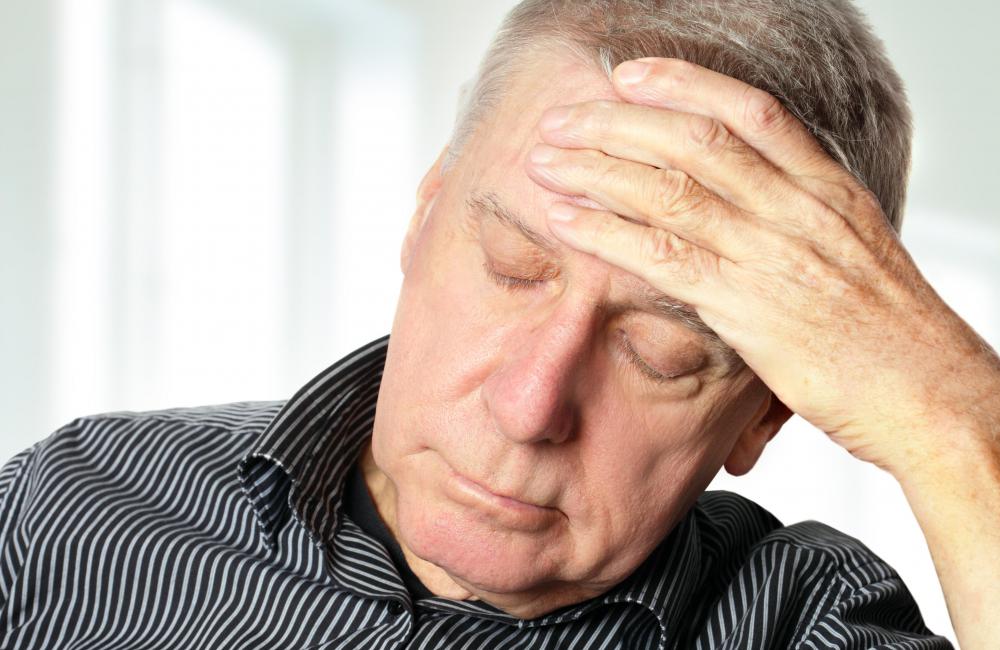At WiseGEEK, we're committed to delivering accurate, trustworthy information. Our expert-authored content is rigorously fact-checked and sourced from credible authorities. Discover how we uphold the highest standards in providing you with reliable knowledge.
What are the Symptoms of Pneumonia?
There are many different causes of pneumonia, which can be roughly defined as fluid accumulation in the lungs. Signs and symptoms of pneumonia can be as variable as its causes, and sometimes those in the most at risk populations are least likely to identify that they have the condition, and have the mildest symptoms. For instance people with bacterial pneumonia, especially the elderly, may have few symptoms, and not get the typical fever associated with the condition. This is unfortunate, since bacterial pneumonia puts the elderly at much greater risk than it would the young to middle-aged adult population, and treatment may be delayed because diagnosis is not made immediately.
In general, though, people with pneumonia caused by bacteria are likely to experience some shortness of breath, coughs that expectorate thick green or yellow mucus, and chills and fever. The chest can hurt significantly, and people may also feel a general overall malaise or extreme exhaustion. Pneumonia of this type can occur on its own or occasionally progresses from other illnesses, like cold and flu viruses. If you’ve recently had a virus, and you note these symptoms occurring you should definitely get to a doctor to rule out pneumonia.

Viruses may also cause pneumonia, which is not bacterial. Symptoms of pneumonia that is viral differ from bacterial pneumonia, though you can develop secondary bacterial infections from viral pneumonia. Main symptoms of pneumonia of viral origin are dry coughs, shortness of breath, and sudden onset of fever. People have compared this illness, since it can occur suddenly to feeling like they’ve been run over. Fatigue is significant, headache may be present, and the muscles may ache. It’s similar to having the typical yearly flu without other flu symptoms like sore throat or nasal congestion.

Some people are particularly susceptible to a type of pneumonia called pneumocystis carinii. This is most common in people who have weakened immune systems, like people with HIV, autoimmune disorders or people on immunosuppressant drugs. Those who’ve had transplants for instance, may develop p. carinii. Symptoms of pneumonia of this type include weakness and fatigue, dry cough, and fever. Shortness of breath is usually present, and cough won’t go away without treatment.

Like bacterial versions, mycoplasma usually responds to treatment by antibiotics, but it may not be noticed, and some people recover without treatment. Failure to diagnose mycoplasma is a problem because this type of pneumonia tends to be the most contagious. Kids with walking pneumonia in school easily pass this bug to other children, and people who work in crowded work situations can pass mycoplasma onto coworkers.

Walking pneumonia or mycoplasma causes symptoms of pneumonia similar to those experienced if you have viral pneumonia. The main difference is that the symptoms of pneumonia of the “walking” type tend to be much milder, and don’t result in people feeling like they need to stay in bed; hence the term walking. People may feel tired, and have a dry cough, which may last for several months, even if the condition is treated.

Since pneumonia in all its forms, with the possible exception of mycoplasma, can be a very dangerous illness, pay attention to symptoms that might indicate the condition. If in doubt, see diagnosis from a physician. If you have pneumonia, treatment is important so you can get well sooner and so you don’t develop complications of a life-threatening nature.
AS FEATURED ON:
AS FEATURED ON:

















Discussion Comments
Children tend to have the worst of pneumonia. My niece had it as a toddler and she suffered so much. Her parents regretted not having her vaccinated. Young children and people over 65 definitely need to get the pneumonia vaccine.
@donasmrs-- I'm not an expert on this topic but I think what happens is that elderly tend to have weaker immune systems. So the immune system cells don't react to intruders as well as they used to. Many of our illness symptoms like fever are actually immune system responses to kill these intruders. So when the immune system isn't responding as it should, there are less symptoms. But this doesn't mean that the illness isn't there or that it's worsening and causing complications.
It's actually a good thing if someone experiences all the typical symptoms of pneumonia like fever, coughing, fatigue, muscle aches and difficulty breathing. It will make it easy to diagnose and i will be treated before complications occur.
It's surprising that the symptoms of pneumonia are milder in the elderly. I would have expected it to be exactly the opposite. Like the article said, this is unfortunate because pneumonia can be detrimental for especially the elderly if it goes untreated. And people are more like to ignore it if they don't realize that they are dealing with a serious condition.
An elderly neighbor was recently hospitalized with pneumonia. I suspect that he experienced the same issue.
Post your comments